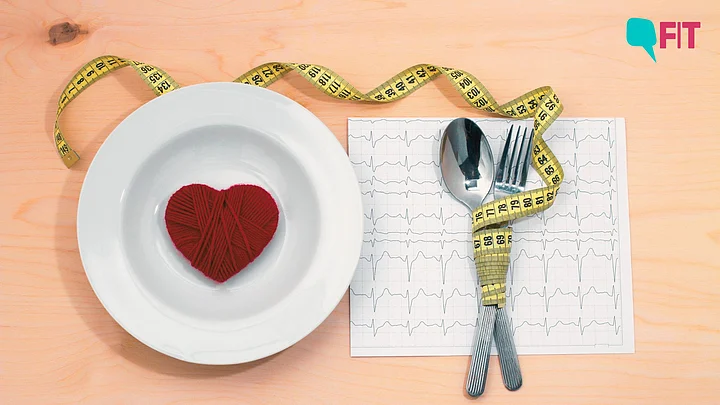Intermittent fasting is a wildly popular diet touted to have a slew of health benefits, including weight management and improvements in metabolic health.
"Some studies even suggest that intermittent fasting may enhance brain function, improve focus and reduce the risk of neurodegenerative disease like Alzheimer's."Sweedal Trinidae, chief dietician , P D Hinduja Hospital
However, over the years, the diet has also come under fire for its potential risks outweighing the potential benefits.
Adding to the list of cautionary studies, a paper published by the American Heart Association’s Epidemiology and Prevention found that people following an 8-hour time-restricted eating schedule faced a staggering 91 percent higher risk of death from cardiovascular disease compared to those consuming meals across 12-16 hours per day.
So, does this mean you shouldn't do intermittent fasting? Is there more to it? FIT speaks to experts to find out.
Why is Intermittent Fasting So Popular?
First, what even is Intermittent fasting? Intermittent fasting is a form of time-restricted eating, that confines eating to a specific window within 24 hours, commonly ranging from 4 to 12 hours.
The popular 16:8 protocol, for example, involves consuming all daily meals within an 8-hour window and fasting for the remaining 16 hours.
"Individuals should stop eating after 7 PM or 8 PM and continue fasting until the morning, with the first meal being consumed at 8 o'clock. This type of fasting is much more beneficial and healthy rather than opting the fast for long hours," says Dr Shikha Sharma.
Advocates of this approach highlight its ability to improve various cardiometabolic parameters such as blood pressure, glucose levels, and cholesterol.
Despite the short-term benefits often associated with time-restricted eating, the study underscores the importance of considering its potential risks, particularly for individuals with existing heart conditions or cancer.
"Intermittent fasting have various positive sides but it can also cause an individual to experience negative symptoms like potential nutrient deficiencies, hunger, overeating and irritability."Sweedal Trinidae, chief dietician , P.D Hinduja Hospital
'The Study Has It's Limitations'
For one, experts point out, the study hasn't been peer reviewed yet. Moreover, while the paper says it involved 20,000 participants in the US, the study's findings, by the admission of its authors, is based on self-reported information by the participants.
Commenting on the findings of the study, Dr Sudeep Khanna, Senior Consultant , Gastroenterologist, Indraprastha Apollo Hospitals, says, "It's too early to jump to any conclusion."
"The study has many limitations like it does not reveal the type of diet the subjects were on, what kind of statistics they used and how often they have followed up. We should not jump to accepting the conclusion."Dr Sudeep Khanna
Intermittent Fasting and Health Risks: 'What You Eat Matters'
According to Dr Shikha Sharma, "The issue lies not with intermittent fasting, but rather with what people choose to eat after fasting."
She adds,
"There's a misconception that fasting for 16 hours grants a free pass to indulge in unhealthy foods during the 8-hour eating window, which is incorrect."
Dr Shikha Sharma goes on to say, one must break the fast with alkaline food like figs, coconut water, and fruits when the eating period starts.
On the flip side, it's crucial to avoid tea, coffee, refined flour (maida), processed foods, and other junk foods. Making wise dietary choices is key to reaping the benefits of intermittent fasting while promoting overall health and well-being.
"It's best to avoid fasting between 12 PM and 3 PM, as this is when the body undergoes peak acid production and metabolism. Instead tindividual should start fasting from after 6 PM until the next morning at 9 AM."Dr Shikha Sharma
'Intermittent Fasting Isn't For Everyone'
According to Dr Shikha Sharma, Intermittent fasting is not recommended for people over the age of 60 and those under 20 years old.
Moreover, she says, pregnant women and individuals with specific health conditions such as diabetes, liver problems, kidney problems, gallbladder stones, ulcers, epilepsy, Alzheimer's disease, and PCOS should avoid intermittent fasting.
"Any healthy Individuals above 20 years who wish to loose weight should opt for intermittent fasting only under medical supervision".Dr Sudeep Khanna , Senior Consultant , Gastroenterologist , Indraprastha Apollo Hospitals
Dr Sudeep also reiterates that intermittent fasting does not have a negative effect on the digestive system or heart as long as the right food is being consumed.
He explains, during intermittent fasting, glucose from the liver acts as a source of energy. Later, fat gets converted to glucose and acts as a source of energy. There is no harmful effect on any organ instead it is beneficial but only if the right food is being consumed.
This research serves as a reminder of the complexity of diet-health relationships and the importance of continually evaluating and refining dietary recommendations, as well as the need for further clinical research on the matter.

